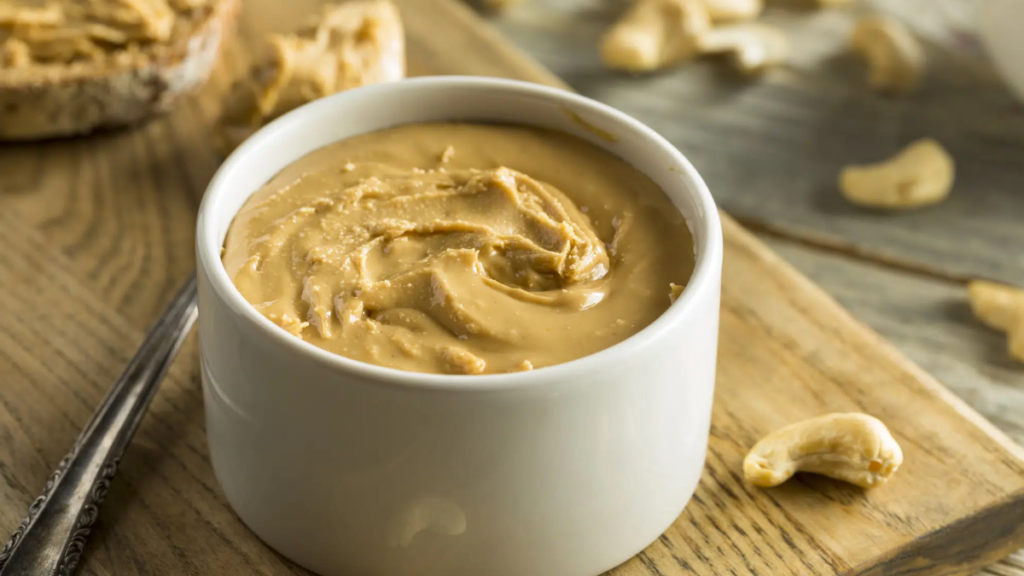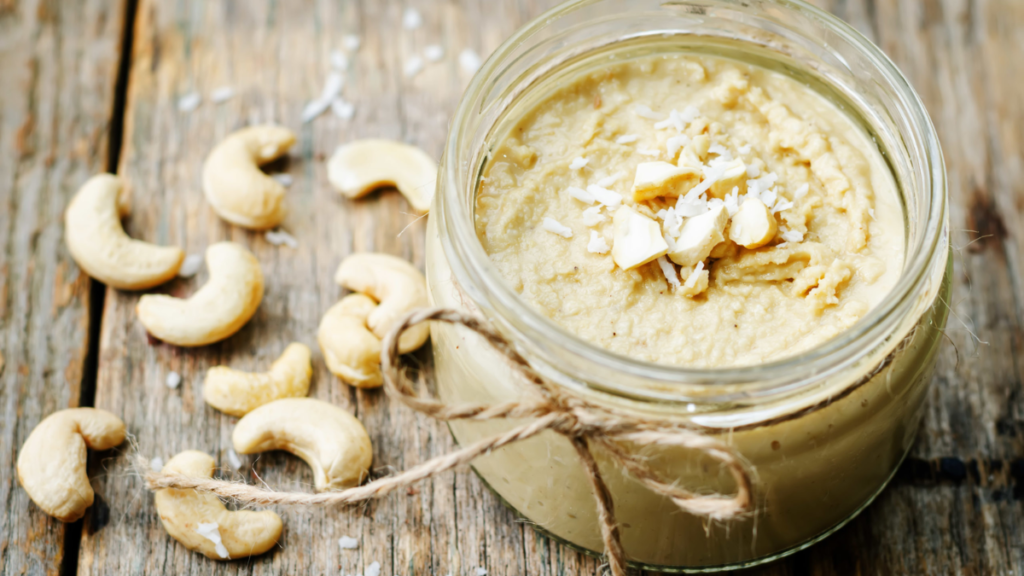Cashew butter has gained popularity over the past several years as more people have become aware of its health benefits and delicious flavor. But many people are interested to know how long cashew butter keeps. Cashew butter is easy to make and is a delicious, nutrient-dense, and extremely practical ingredient to have on hand.
How long does handmade cashew butter, in particular, last? When cashew butter is created from scratch, it may not be easy to know how long it may be securely stored. Your cashew butter’s shelf life greatly depends on how you keep it and what you put inside it. Cashew butter will have a “best before” or “use by” date written on the jar by the manufacturer to spare you the hassle.
What is Cashew Butter?
Cashew nuts are used to make cashew butter. Cashew nuts, whether “raw” or roasted, are pounded in a food processor or blender until they are creamy and spreadable enough to put on toast. There may be an addition of flavors like salt and sugar. Depending on your preferences, you can flavor your cashew butter.
You can buy cashew butter in stores, but be careful to look for varieties with only cashew nuts and few to no additives. These lessen cashew butter’s flavor and nutritional advantages.
A rather common occurrence that some individuals may confuse for spoilage. A quick swirl of the cashew butter will remedy this. The cashew butter’s solids and oils will naturally separate as it is kept.
Unsaturated fatty acids, protein, vitamins B6 and K, magnesium, copper, zinc, phosphorus, and manganese are all abundant in cashew butter. As long as the jar you buy is made entirely of cashew butter, it is devoid of sugar and other additives.
Cashew butter is an excellent supplement to restrictive diets like veganism or the ketogenic diet because it is dairy-free, low in sugar, and high in healthy fats. It can be used as a cheesecake base, a soup thickener, and a spread for toast.
How to Tell if Cashew Butter is Bad?
The best course of action if you’re unsure whether your cashew butter has gone bad is to follow your gut. If you sense it’s not good, you might be right. You might have expired cashew butter if you open your jar, which looks and smells strange.
In the paragraphs below, I’ll go over some ways you can determine whether your cashew butter is rotten.
My first piece of advice is primarily for store-bought cashew butter; the rest apply to both types.
Step 1: Inspect the Jar
Take a close look at the cashew butter in your container. Do any holes seem to be present in it? Or does the jar seem enlarged or bowed? If so, it might be wise to discard it.
Step 2: Inspect the Cashew Butter
Look into the cashew butter jar you just opened. Are the oils and solids separate and unable to recombine? You might want to throw away your cashew butter. Creamy cashew butter is made fresh. Another sign that it’s time to discard your cashew butter is if it seems dry and hard.
Step 3: Smell the Cashew Butter
It is better to toss away cashew butter if you smell it and notice an unpleasant or rotten scent. Fresh cashew butter smells gentle and sweet; it shouldn’t have a strong fragrance.
Step 4: Have a Tiny Taste
The flavor of fresh cashew butter is mildly sweet and nutty. It needs to have a creamy texture. If you sample your cashew butter and it tastes rancid, it is likely past its expiration date.
How Long does Cashew Butter Last?
How you keep your cashew butter will greatly impact how long it lasts. Leaving cashew nuts in hot, humid circumstances can cause them to get rancid very rapidly.
Make sure your cashew butter is cool and dry if you plan to keep it in the pantry. The best choice for keeping cashew butter fresh is to keep it in the refrigerator.
Always ensure the tools you put inside an opened container of cashew butter or homemade butter are germ-free, and avoid using your fingers.
Cashew butter from the store will have a best before date. It is normally safe to eat cashew butter if you open the jar, and it looks, smells, and tastes fine. The cashew butter’s taste may not be as fresh as the best before date, which is a positive indication.
The cashew butter you make yourself will go bad the quickest. If you don’t intend to consume it immediately, keep your eyes and nose on it.
How to Use Cashew Butter?
There are numerous uses for cashew butter, from a cheesecake’s base to an ingredient in your morning smoothie, from a spread on your toast to a cheesecake. Cashew butter is versatile in vegan diets and can be utilized in various inventive ways.
It may be used as a cream cheese substitute in cheesecakes and dips, a thickening in sauces and soups, a salad dressing, and so much more. If you’d like, grab a big spoonful of cashew butter and consume it straight from the jar!
Culinary Uses of Cashew Butter, Cashew Spread
- Almond or peanut butter can be substituted with cashew butter.
- Cashews’ rich, creamy texture makes this butter a crucial component of soups, sauces, and dips that call for a cashew flavor.
- Additionally, it can be used as a salad dressing and a spread on crackers and fresh fruit.
- This paste can be used liberally to add depth of flavor and taste to rich curries like cashew butter chicken.
- The frosting from cashew butter provides an unusual flavor for cakes, pies, cupcakes, and pastries.
How to Store Cashew Butter?
Cashew butter storage in the pantry In the pantry, cashew butter can be kept in any state—unopened, opened, or freshly produced. The date listed in the table above is the expiration date for properly stored cashew butter. I’ll review some tips with you so you can make the most of your cashew butter.
Make sure your cashew butter is kept cool, dry, and out of the way of heat and moisture if you’re keeping it in the pantry. The shelf life of opened jars of cashew butter will be shorter in the pantry than in the refrigerator.
Refrigerator Cashew Butter Storage, The shelf life of your opened jars of newly made cashew butter will be significantly extended by storing them in the refrigerator. The oils will last longer before going bad in a colder atmosphere. When storing your opened jar of cashew butter in the refrigerator, ensure the lid is properly screwed on. Ensure the freshly prepared cashew butter is sealed in an airtight container before placing it in the refrigerator.
What does Cashew Butter Taste Like?
The flavor of cashew butter is somewhat nutty and slightly sweet. It is a creamier, higher-fat nut butter than peanut butter and almond butter, which makes it a more useful component in cooking.
The flavor of cashew butter is extremely rich, distinctive, yet delicate. It is more creamy than any other nut butter and is wonderfully thick and creamy. Making this spread incredibly adaptable to a variety of recipes.
In its most natural state, devoid of additions, it tastes faintly nutty, somewhat sweet, and salty. The real flavor of excellent cashew butter could be ruined if you buy a jar containing additions. Therefore, try to choose a jar that contains only cashew nuts. You can also create cashew butter at home as an alternative.
It can be used as a thickener, base, seasoning, and more in soups, sauces, dips, desserts, curries, and more. It is rich, creamy, and thick.
Cashew butter is a terrific addition to a wide range of recipes since it has a mellow flavor that is considerably milder than other nut butter. It is a favorite in many vegan households and a fantastic cream substitute.
Can you Freeze Cashew Butter?
Cashew butter should be kept in the refrigerator in a glass jar to last for at least two weeks. If you want to freeze some of it, it is also freezer-friendly. When ready to use it, let it thaw overnight in the refrigerator. If the refrigerator is not an option, keep your nut butter in a cool, dry, and dark location. To prevent bacterial contamination, always scoop nut butter with a clean spoon. Jars left at room temperature may only be usable for four weeks before turning. Our butter can be kept in the refrigerator to preserve its freshness, making it difficult to spread.
Some individuals like to smooth out and sweeten their homemade cashew butter by adding ingredients like sugar or coconut oil. As a result of the naturally existing oil, they will eventually harden if not chilled. For optimum use, we advise storing in a cold, dark environment. Yes, cashews are the only ingredient used to make cashew butter. No salt, sugar, or oils are required. Today, we’ll simplify things and make homemade cashew butter using just one basic ingredient.
Conclusion
It’s difficult not to appreciate the luscious, creamy spread known as cashew butter. Whether it is purchased or cooked at home, it is quite delicious. You get the most out of your cashew butter. However, you prepare it, always store it carefully and use clean tools. This article on the shelf life of cashew butter is intended to be both educational and entertaining.
Cashew butter, like most foods, is susceptible to spoilage, largely because of its fatty oils. However, you can extend its lifespan by how you store it and the items you place inside of it. Continue reading if you want to learn some advice on how to store cashew butter so that it lasts as long as possible.


